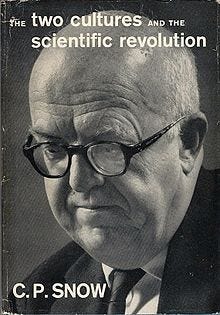Two Cultures
In the year 1959 C.P. Snow gave a lecture entitled Two Cultures at Cambridge University in England. The lecture was later published as a book.
His starting point is that, until quite recently, what we now refer to as science and the liberal arts were not separate disciplines. However, in the 17th century the two ways of thought diverged and have continued to do so. These were the ‘Two Cultures’ to which Snow was referring. (He himself claimed to have a foot in both camps. Of himself, he said, “By training I was a scientist: by vocation I was a writer”.)
I believe the intellectual life of the whole of western society is increasingly being split into two polar groups . . . At one pole we have the literary intellectuals, who incidentally while no one was looking took to referring to themselves as ‘intellectuals’ as though there were no others . . . at the other scientists, and as the most representative, the physical scientists. This polarization is sheer loss to us all.
He stated that all scientists, regardless of their discipline, tend to think in the same manner.
They < the scientists > have the future in their bones . . . there is a moral component right in the grain of science itself, and almost all scientists form their own judgments of the moral life.
Regarding ‘the other side’ — the ‘Arts’,
They still like to pretend that the traditional culture is the whole of ‘culture’, as though the natural order didn’t exist . . .
Once or twice . . . I have asked how many of them <the intellectuals> could describe the Second Law of Thermodynamics. The response was cold: it was also negative. Yet I was asking something which is about the scientific equivalent of, Have you read a work of Shakespeare’s?
I now believe that if I had asked an even simpler question—such as, What do you mean by mass, or acceleration, which is the scientific equivalent of saying, Can you read? — not more than one in ten of the highly educated would have felt that I was speaking the same language . . .
Although Snow was writing over 50 years ago, his words continue to resonate. They are particularly relevant to the church community if it is to provide leadership in an Age of Limits.
Recently, I was talking to a lady who was visiting our church. She and her husband are firmly committed to environmental issues, and they fully understand the need to respond to the climate crisis. Yet, when I suggested that we all need to have a grasp of the Second Law of Thermodynamics, she threw up her hands in horror. Yet, ironically, most people intuitively understand the three laws. For example,
The First Law
Energy cannot be created or destroyed.
There’s no free lunch.
The Second Law
Natural processes always move toward increased disorder.
You cannot unscramble an egg.
The Third Law
As a system gets closer to absolute zero temperature, its disorder (entropy) approaches a minimum value.
Perfect is the enemy of good enough.




